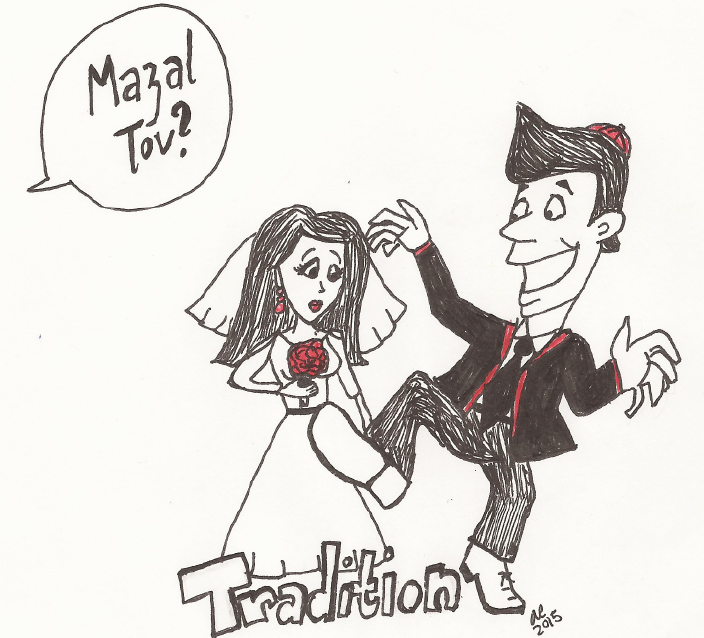Illustration by Angelina Ellyason
________________
With its many laws and customs, Judaism has always valued the sacredness of marriage. Consequently, marrying Jewish has prominently been seen as non-negotiable for many in the Jewish community. The apprehension of assimilation and having the miniscule Jewish population dwindle down even further haunt our already-worried Jewish mothers, giving them something else to kvetch (“complain”) about. As a result, the concept of marrying a “nice Jewish boy/girl” is not foreign to many of us; however, it is the actual implementation of said concept that seems to have fallen short in more recent years. This has led me to question whether marrying Jewish is still relevant, and whether marrying a non-Jew has become more acceptable.
According to a 2013 survey conducted by the Pew Research Center, intermarriage rates have grown significantly in the past few decades. Why, though, has marrying within the religion been demoted from being a top priority on many Jews’ relationship wish lists?
When being told as a child that we couldn’t have a toy, a tantrum was sure to ensue. When we were told as a young adult that drinking alcohol was prohibited, our desires to sneak in even just a taste of the vodka sitting on our parents’ bar was all the more ignited. And when it comes to relationships, anyone call tell you that “playing hard to get” will almost always catch the attention of your crush. Let’s face it, we love what we can’t have and are most attracted to what seems unreachable. Likewise, when we’re told that our dating pool should only consist of the small Jewish population that surrounds us, it is tempting to venture away from what is expected from us. Yet, such desires do not amount to anything significant and are ultimately foolish.
Another factor that has dissuaded Jews from marrying other Jews is negative stereotypes. We’ve all heard of the “Jewish-American Princess,” also known as a “JAP” (not to be mistaken for the ethnic slur referring to Japanese minorities during WWII). This is a pejorative stereotype insinuating that Jewish girls are high-maintenance, materialistic and annoying. Jewish boys, on the other hand, are stereotyped for being greedy, dishonest and mamas’ boys. Such stereotypes have the ability to scare people off and discourage Jews from seeking a Jewish counterpart. Interestingly, however, many non-Jews tend to be attracted to Jews with different, more positive, stereotypes in mind: that Jewish husbands know how to treat women right and serve as good providers; that Jewish wives are nurturing and loyal. At the end of the day, though, it would be irrational to let baseless stereotypes motivate or encourage the pursuit of a Jewish relationship.
Conversion has been another factor surrounding the question of whether or not Jews should marry Jewish. Why marry Jewish when your spouse can just convert for you? But, this argument fails to consider an obvious problem: what if they don’t convert? Converting to Judaism is a serious change that is a lot harder than one would expect, and it can involve multiple years to complete. One is traditionally turned down three times before even being considered for conversion. After one begins the process, he or she must take several steps, including spending at least a year studying, to covert. In short, asking someone to give up his or her religion is a lot to ask, and Jews should therefore not enter a relationship expecting partners to convert. Moreover, most rabbis will not convert someone just for marriage in the first place; rather, the potential convert must be genuine and convert for deeper, more spiritual reasons.
Another cause of intermarriage occurs when Jews enter relationships with non-Jews without the initial prospect of marriage, but get “stuck” as things escalate and strong feelings develop. Love has a way of sneaking up on people and leaves them asking why love shouldn’t trump all. But what most lovestruck people fail to recognize is that love is only one of many necessary prerequisites to maintaining a happy and healthy marriage. Interfaith marriages can easily create many problems and disagreements for the couple on issues such as how to merge families, how to raise the kids, and how to celebrate holidays. Even kids themselves become greatly confused and can easily end up with identity problems. In fact, according to research done by the New York Times, interfaith marriages are much more likely to fail and end in divorce than same-faith ones because of the problems they face.
Additionally, many Jews increasingly eschew any religious affiliations, and such nonobservant or nonaffiliated Jews see no value in marrying Jewish. Not to mention the fact that some Reform and Reconstructionist approaches to halachah (“Jewish Law”) argue that intermarriage is not forbidden. Although such Jews may consider themselves to be unaffiliated, they still have a certain background with differences that date back to many years ago. Even such subtle differences have the ability to affect compatibility and adjustment between spouses.
Moreover, the media has made interfaith marriage within Judaism seem less estranged and more acceptable. Many Jewish celebrities are seen dating or marrying non-Jews. Even Jdate has three different types of non-Jewish members: “willing to convert,” “not sure if I’m willing to convert” and “not willing to convert.”
Ultimately, the idea of Jewish survival is one that should be thoughtfully considered. It should not come as a surprise that interfaith marriages weaken the Jewish identity of many Jews, and eventually lead to a decrease in the Jewish population. According to Pew, “the offspring of intermarriages – Jewish adults who have only one Jewish parent – are much more likely than the offspring of two Jewish parents to describe themselves, religiously, as atheist, agnostic or nothing in particular.”
Time and time again, the Jews have faced enemies who have failed to implement their goal of Jewish annihilation. How sad would it be if Jews themselves ended up lending a hand in the decline of the Jewish nation?

